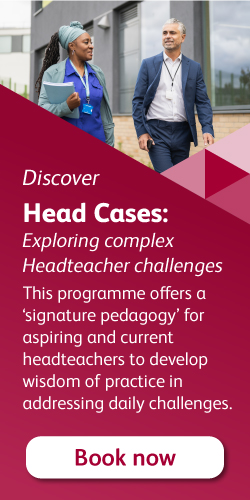
Contemplating headship? Concerned that the NPQH, for all its benefits, hasn’t quite given you the experiences that you know you will face in taking up the role? Considering how you might bridge the experiential gap between being a deputy and being the person with their name on the signage? If so, you are crucial to the future of the education system. This post is for you.
SSAT’s Head Cases programme is designed to fill the gaps in headteacher preparation programmes. From our research into headteacher retention, which synthesised 26 separate studies published on the topic since 2018, we found that “headteacher preparation and induction does not effectively reflect the role’s demands”. Concerns about this included:
- Aspiration to headship is declining due to the perceived impact on wellbeing.
- Headteachers find a significant gap between their expectations of the role and its reality.
- Finance, strategy, risk. HR, and legal acumen are not effectively conveyed by training.
Based on our secondary research, we surveyed 236 serving or former headteachers about their experiences of headship. Amongst the key findings of this primary research, we found that “existing headteacher preparation, induction and training are seen as insufficient for the practicalities and complexity of the role”. Their responses told us that:
- The NPQH was seen as ‘insufficient’ or ‘poor’ by 86% of those who mentioned it.
- 34% of respondents believed that they had no meaningful preparation for headship.
- 40% of headteachers said that they had little or no support once in the role.
Additionally, these headteachers told us that the challenges that most challenged them in the role, and for which they felt least well-prepared, included accountability processes (51%), budget pressures (42%), parental complaints (25%) and human resources challenges (29%).
The Head Cases programme has been constructed to respond to these pressures and challenges. Over five sessions, touching upon these complex challenges not being met by other programmes, colleagues on the programme will use case method approaches to make sense of what it means to be a headteacher.
Each case will be a convincing example of the kind of cases headteachers routinely come across in their work. They will initially seem like operational challenges, but the webinars will address the ways in which they represent strategic choices and the vision and lived values of school communities. We will be exploring different perspectives as being of equal legitimacy to consider the agency of headteachers. And we will be foregrounding the policy and guidance around each of the issues to consider the ways in which headteacher agency is constrained.
The ’cases’ that we will be covering in the Head Cases programme are:
- The parental complaint case: when good stakeholder relations turn sour
- The human resources case: open doors and/or behind closed doors
- The budgeting case: navigating competing goods whilst balancing finances
- The permanent exclusion case: personal ethics amidst tough choices
- The accountability case: retaining authenticity whilst playing the game.
Above all else, on the Head Cases programme we will be inviting participants to work as a community of inquiry. Our survey findings identified that working alongside others is important for professional learning (19%) and for peer support (34%). With these insights in mind, those joining the programme will be making sense of the profound and complex challenges inherent to headship as well as the fact that they have a significant impact on the individual headteacher.
In short, Head Cases is a different kind of headteacher preparation programme that offers those aspiring to the role (as well as those already appointed to it) a unique opportunity to work in a thoroughly collegial environment of support, challenge and reflection. Taking the moral and ethical experiences of headship experience seriously is crucial to good and effective decision-making. Doing so with others, as you will on the Head Cases programme, is essential to this.
Head Cases: Exploring Complex Headteacher Challenges
This programme of webinars will use case study methods and Socratic dialogue to explore the complex practical and philosophical challenges facing headteachers.

